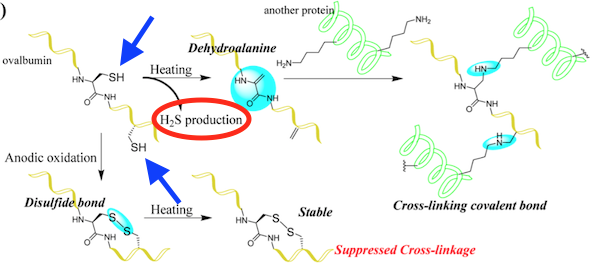Boiling an egg is useful. It kills bacteria, such as Salmonella, which may be on or even inside the egg. Heat treatment also triggers chemical reactions (specifically, protein crosslinking) that convert the egg into a gel, which makes it tastier and far easier to eat.
However, these same chemical reactions can also cause heated eggs to smell like farts. (This is particularly true of hard-boiled eggs.) A major protein inside the egg, called ovalbumin, possesses the sulfur-containing amino acid cysteine. When heated, these sulfur atoms are converted to hydrogen sulfide, the nasty gas associated with rotten eggs and bodily functions. It doesn't take much to wrinkle our noses. Humans may be more sensitive to hydrogen sulfide than sharks are to blood in the water.
Japanese chemists are fed up. So a team of researchers showed that, if first treated with electricity, egg whites can release little to no hydrogen sulfide. (The diagram below depicts what happens at the chemical level to the egg protein ovalbumin. The pre-treatment of egg whites with electricity is referred to as "anodic oxidation.")

In the diagram, sulfur (technically, a thiol group, -SH) is marked with a blue arrow. Heating is more likely to convert these groups to stinky hydrogen sulfide, while pre-treating the eggs using anodic oxidation is more likely to convert them to a stable disulfide bond that will not produce hydrogen sulfide upon further heating.
Besides stinking less, the authors also found that oxidized egg whites had several unique properties. Compared to conventionally produced egg whites, their oxidized egg whites had fewer protein crosslinks and were softer. Also, as the amount of electricity applied in the oxidation step increased, the temperature required to gel the egg whites decreased. This could be useful. Any processed foods that contain both eggs and meat often must be cooked at a higher temperature to properly gel the egg. But too high of a temperature can damage the meat. Lowering the temperature needed to properly gel the egg might help prevent this.
Unfortunately, electrochemical cooking of eggs isn't something you will be able to do in your kitchen. To cook their eggs, the authors first added various ions (necessary for the electrochemical reaction) and adjusted the pH to 9.0 with hydrochloric acid, after which they electrolyzed the egg with a galvanostat. If their technique proves practical or sufficiently advantageous, the only places capable of adopting it will be commercial or industrial kitchens.
Source: Masahito Takahashi, Akihiro Handa, Yusuke Yamaguchi, Risa Kodama, and Kazuhiro Chiba. "Anodic Oxidative Modification of Egg White for Heat Treatment." J. Agric. Food Chem., 64 (34): 6503–6507. Publication Date: 12-August-2016. DOI: 10.1021/acs.jafc.6b02785

